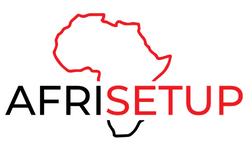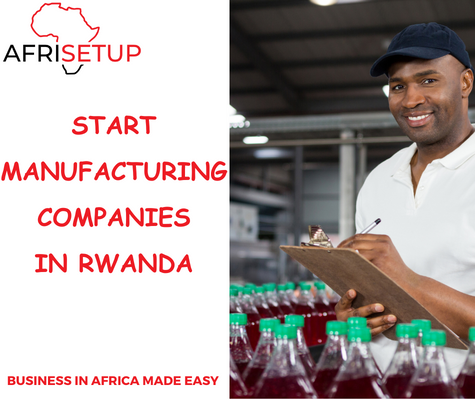- By afrisetupconsultants
- Uncategorized
- 0 Comment
Start manufacturing companies in Rwanda – The manufacturing industry in Rwanda is still small, but it is steadily growing. In 2019, the manufacturing sector in Rwanda contributed about 19% to the country`s GDP. It is characterized by gradual diversification from basic manufacturing to more value adding activities. The government of Rwanda has put in place policies and strategies to help grow the sector, due to its contribution toward the economy of Rwanda. Some of the policies include, Made in Rwanda policy, Entrepreneurship Development Policy, Special Economic Zone Policy, and the National Export Strategy. The government has also created Industrial parks.
Are you a foreign investor looking to start manufacturing companies in Rwanda, but feeling overwhelmed by the extensive paperwork involved in the process to register a company in Rwanda? Look no further! Afrisetup offers expert assistance in streamlining the registration process right from the comfort of your home. Save time and hassle while ensuring compliance with local regulations. Contact us today to kickstart your business journey in Rwanda with confidence!

List of manufacturing companies in Rwanda
With a focus on industrialization and economic diversification, Rwanda has seen the emergence of numerous manufacturing companies across different industries. These companies play a pivotal role in driving economic growth, creating employment opportunities, and contributing to the country’s overall development agenda. If you are looking to start manufacturing companies in Rwanda, you can learn a lot from these already-established companies.
Here is a list of manufacturing companies in Rwanda:
Ø Sulfo Rwanda – It is the second largest manufacturing company in Rwanda. It produces a wide range of consumer goods which include: soap, lotions, washing detergents, skin lightening products, and sweets.
Ø Bralirwa Brewery – It is the largest brewer and soft beverage company in Rwanda. The company specializes in beers and soft drinks.
Ø Rwanda Mountain Tea – It is a privately owned holding company that primarily engages in tea production. It manufactures and trades in organic black tea and Green Orthodox Tea.
Ø Africa Improved Foods Rwanda Limited – It is a manufacturer of highly nutritious quality fortified foods. Their products aims at addressing malnutrition among vulnerable segments in population of Rwanda.
Ø Inyange Industries – It is a food processing company in Rwanda, dealing in a variety of products under their brand name. It specializes in fruit products, fruit juices and dairy related products.
Ø Imana Steel Rwanda Limited – It is a company that was started by the merger of Sigma Group India.
It specializes in metallurgy. It produces stainless steel, iron and steel products.
Ø Inzuki Designs – It is a Rwandan brand that specializes in jewellery, accessories and interior décor consisting of local materials that are handmade.
Ø Ampersand – It is an electrical energy transport company serving a commercial e-motorcycle fleet and battery swapping network in Rwanda.
Ø Gasmeth Energy Limited – It is a company that deals in the extraction and processing of methane gas in Rwanda.
N|B – To start manufacturing companies in Rwanda requires careful planning, dedication, and perseverance, but with the right strategy and execution, it can lead to long-term success. Call us to get started!
Steps to Start Manufacturing Companies in Rwanda
There are some key steps to consider before you start manufacturing companies in Rwanda. Each of these steps involves specific requirements and processes that should be considered to ensure a smooth and successful company formation.
Some of the steps include:
1. Business Registration in Rwanda – This involves selecting the business category that the company is going to operate in and then register it through the RDB registration system.
2. Meeting Eligibility Requirements – A person starting a manufacturing company in Rwanda should be of a sound mind and attained the legal age requirement, should have the required capital to start the company and provide the details of the directors and the shareholders of the company.
3. Getting the necessary licenses and permits – You need to get the relevant licenses and permits that are needed for your type of manufacturing processes and company.
4. Register with the commercial registrar – Submit your business details to the commercial registrar such as the business name, location and any other relevant information that may be required for registration.
5. Compliance with Foreign Investment Requirements – Foreign investors are supposed to ensure that they comply with the foreign investment regulations that are in the country such as providing a power of attorney and authenticated copies of company registration documents.
Contact Us today for Expert advice
Requirements to start manufacturing companies in Rwanda
To start manufacturing companies in Rwanda, you’ll need to adhere to certain legal, regulatory, and practical requirements. Here’s a general outline:
a) Develop a detailed business plan outlining your company’s objectives, target market, products to be manufactured, marketing strategies, financial projections, and operational plan.
b) Choose a legal structure for your company, such as sole proprietorship, partnership, or limited liability company (LLC). Register your business with the Rwanda Development Board (RDB) and obtain a Tax Identification Number (TIN).
c) Register a company in Rwanda with the RDB. This involves obtaining an investment certificate and registering your company name. You’ll also need to obtain necessary licenses and permits depending on the nature of your manufacturing activities.
d) Find a suitable location for your manufacturing facility. Consider factors such as proximity to suppliers, accessibility, infrastructure, and zoning regulations.
e) Determine your startup capital requirements and secure financing. This could be through personal savings, loans, venture capital, or government grants and incentives.
f) Ensure compliance with Rwandan regulations governing manufacturing businesses. This includes adhering to labor laws, environmental regulations, health and safety standards, and any industry-specific regulations.
Key Industries for Manufacturing in Rwanda
The major industrial activities in Rwanda mainly involve the processing of coffee, tea, bananas, beans, sorghum, potatoes, and other agricultural commodities. Smaller-scale industrial products include cement, soaps, furniture, shoes, plastic goods, textiles, cigarettes, and small-scale beverages. Most of the goods are produced for domestic consumption.
Some of the key manufacturing industries and sectors include:
- Agro-processing: Given Rwanda’s primarily agrarian economy, agro-processing is a significant sector. It involves adding value to agricultural products such as coffee, tea, fruits, and vegetables. This includes activities like milling, canning, packaging, and preserving, contributing to both domestic consumption and exports.
- Textiles and Apparel: The textile and garment industry has been growing steadily in Rwanda. The country aims to become a hub for textile and apparel manufacturing, attracting investments and creating employment opportunities. Initiatives such as the Kigali Special Economic Zone (KSEZ) have been established to support this sector’s growth.
- Construction Materials: With Rwanda’s ongoing infrastructure development and construction projects, there is a demand for locally produced construction materials such as cement, steel, bricks, and roofing materials. Investing in the manufacturing of these materials not only supports infrastructure projects but also reduces reliance on imports.
- Chemicals and Pharmaceuticals: There’s been a push to develop the chemicals and pharmaceuticals industry in Rwanda to meet the growing demand for healthcare products and to reduce dependency on imports. This includes the production of generic drugs, medical supplies, and other essential chemicals.
- Plastics and Packaging: With the increasing consumer goods market and industrial activities, there is a demand for plastic products and packaging materials. Manufacturing of plastic goods such as bottles, containers, and packaging materials presents significant opportunities for investment and growth.
- Information and Communication Technology (ICT) Hardware Assembly: Rwanda aims to position itself as a regional ICT hub. The assembly of ICT hardware such as computers, smartphones, and other electronic devices presents an opportunity for local manufacturing, supported by initiatives like the Made in Rwanda campaign.
- Renewable Energy Technologies: With a focus on sustainability and energy independence, Rwanda has been investing in the manufacturing of renewable energy technologies such as solar panels, biomass stoves, and biogas systems. These efforts align with the country’s goals for green growth and environmental sustainability.
Contact us today to understand more about the Economy Of Rwanda
Advantages of Starting Manufacturing Companies in Rwanda
When you start manufacturing companies in Rwanda, you’ll enjoy several advantages owing to the country’s conducive business environment and strategic location in East Africa. Here are some of the key benefits:
1. Strategic Geographic Position – Rwanda is strategically located offering a great market to the neighboring countries such as DRC which is one of the present one of the largest markets in Africa.
2. Doing Business is Easy – Rwanda is among the top three nations in Africa for ease of doing business. Rwanda is also one of the best countries in Africa to register a business as the process can be completed in a single day.
3. Low Risk Factors – Rwanda has one of the lowest crime and corruption rates on the African continent. This portrays a very stable and safe environment for conducting business.
4. Tax Incentives and Investment Policies – Rwanda is one of the African countries with proactive trade and investment policies which aim at attracting foreign direct investment. It also has tax incentives such as preferential corporate income tax rates, expedited VAT refunds, and corporate income tax holidays.
5. Great Connectivity – It has one of Africa’s fastest internet connections and also the government has decided to make internet availability throughout the country, as there are numerous free wireless spots in public places.
6. Huge Local Market Demand – There is a great demand and opportunities, especially in housing and real estate, construction, energy, commercial agriculture, food processing, telecommunications, ICT, and business services.
7. Fast Growing Economy – The World Bank has regarded Rwanda’s economy as one of the world`s fastest-growing economies alongside other countries such as Ivory Coast and DRC.
Click here to speak to an expert on Doing Business in Rwanda
Tips to succeed when starting manufacturing companies in Rwanda
Before you start manufacturing companies in Rwanda, you need to plan and strategize to avoid future challenges and business inconveniences that may arise. Here are some tips to assist you before investing in the manufacturing sector in Rwanda.
a) Conduct a comprehensive market research – Ensure you conduct market research to understand the market demographics such as demand, competitors, and consumer preferences.
b) Understand the regulatory compliances – Familiarize yourself with the local business regulations and requirements needed to start.
c) Constructing local partnerships – Build strong relationships with local manufacturers, suppliers, distributors, government agencies, and authorities to gain support and insights.
d) Proper budgeting and finance arrangement – Ensure you have properly arranged how to raise the necessary venture capital required and also utilize the current incentives that are available for your company.
e) Focus on quality and efficiency – Ensure that you produce world-class quality products to enhance your market competitiveness and also emphasize operational efficiency in your production processes.
f) Embrace modern technology and innovations – Use modern manufacturing technologies and embrace a culture of innovation to develop unique products.
g) Invest in proper training programs – Invest in a skilled workforce by initiating training programs to ensure successful manufacturing operations.
h) Environmental Considerations – Ensure you adhere to the environmental regulations by incorporating environment-friendly practices in your manufacturing activities.
i) Flexibility – Be ready to adjust and adapt to new market changes by always initiating new strategies based on the market dynamics.
FAQs on Starting Manufacturing Companies in Rwanda
What is the manufacturing sector in Rwanda? – Rwanda`s manufacturing sector is still small but gradually growing. It is characterized by a gradual diversification from basic manufacturing to more value-adding activities. Most of the products are for local consumption but the government aims to come up with strategies for increasing exports.
Is Rwanda a conducive environment for manufacturing startups? – Yes. If you are looking to start manufacturing companies in Rwanda, note that the country has a conducive environment for startups because of the many favorable factors such as ease of doing business, supportive government initiatives, availability of tax incentives, and its high demand for products.
How long does it take to set up a manufacturing company in Rwanda? – Setting up a manufacturing company in Rwanda can vary in duration depending on factors such as the type of manufacturing, compliance requirements, and efficiency of processes.
Are there any incentives available for manufacturing companies in Rwanda? – There are government incentives for manufacturing industries in Rwanda such as preferential corporate income tax rates, tax holidays, customs tax exemptions for products produced in export processing zones, value-added tax incentives, and accelerated depreciation incentives.
What types of manufacturing companies are thriving in Rwanda? – Manufacturing industries in Rwanda that are thriving primarily focuses on agriculture, including tea, coffee, pharmaceuticals, soap, textiles, and food products.
How can manufacturing companies in Rwanda access export markets? – To access export markets, manufacturing companies can employ several strategies such as market research and target identification, product adaptation, quality assurance, partnerships, and networking, exploring export financing incentives, e-commerce and digital marketing, compliance with international standards, capacity building, and diversification.
Conclusion
Starting manufacturing companies in Rwanda offers entrepreneurs an opportunity to leverage the country’s favorable business climate, supportive policies, and growing market demand. Contact us today to start manufacturing companies in Rwanda hassle-free!

